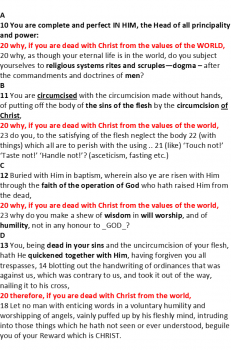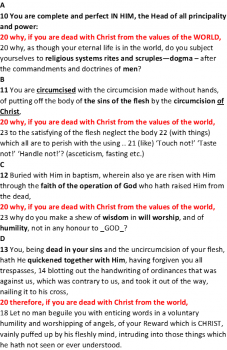It makes no sense to me that law had faith or have no faith. The is not anything that could have faith or not have.
If what you say of the statement of Paul, that is, “the law is not of faith”, wherein you take as to have Paul mean by “of faith” as an abbreviation of “of faith in Jesus Christ”, it makes to point for Paul to cite Abraham’s faith in pointing out that justification is by faith.
It does in the way I explained it. Paul was saying Abraham's faith brought him justification. That is, it brought him temporary justification by his seeking God's forgiveness for his sins. This would ultimately lead to his accepting Christ's atonement for his sins so that he could be eternally justified.
Paul never said that Abraham had "eternal justification"--only that he was justified. That is, God found him righteous, just as God found righteous any man under the Law who obeyed God's requirements from the heart.
That's because justification is by faith, which is seeking God's forgiveness of sins, relying on God's way of living as opposed to a person living his own way, without consulting with God. Asking God for forgiveness is actually a recognition that life should be lived in concert with God. Repenting of sins is repenting of living out of partnership with God, because Man was created to live in fellowship with God.
You see, if we just quote Scriptures without understanding what Paul is saying by his words, and in the context in which he uses those words, we will just be reciting what we think are platitudes or dogmas. True understanding gives meaning to Paul's words as Paul meant to use them. Words are not always understood at face value. They require embracing the context for ourselves, so that we also understand from the same perspective.
What I read about Abraham is that God had chosen him and made a promise to him and his seed. Then after some time God had justified him because of his faith in Him. He was freely justified by God, and that is not because of anything that Abraham had done, nor because he was looking for mercy and forgiveness. It’s just that of faith in God. But even before that, even before Abraham obeyed God, when God send His word to Him (Gen.12:1-3), God had made him a promise that is basically conditioned on nothing. That by itself points to Abraham’s salvation by grace through faith.
Yes, faith is belief in God's word, and belief in things only God can do. But part of what only God can do is forgive us our sins. Therefore, faith is of course trusting in God's Grace to forgive us our sins. I don't know why you would neglect that part of faith?
As I said before, faith is embracing God's word to our heart. Part of that word shows us that we fall short and need His forgiveness, and then accepting that He offers His forgiveness, conditioned on our returning to Him as our source and way of life.
<<<He just didn't look to something like the Law to justify him, because its purpose was to condemn all those in the OT era who had not yet obtained eternal justification through Christ.>>>
Wow, you memorized Romans 4. Great for you. Then you find there that Abraham was justified by faith, righteousness having been imputed to Him by God. It is not that he was righteous, or that he looked forward to someone else, that he was justified. If there is any that Abraham looked at, it is God. His justification came freely from God, God by grace, having imputed to him, righteousness.
It was so long ago, but I believe I memorized most all of Romans back in 72-73. I'm not bragging--it's insulting when you tell me I need to read something that I memorized. Of course you didn't know that. I'm just letting you know.
"Imputation" is another of those "doctrinal" words we learn in Bible School. I have my own way of describing it. Christ provided in himself what we couldn't provide, in terms of living in perfection in order to obtain eternal life. He achieved that perfection for us, and then let us live in him by the Spirit he gave us. Since he gave us his Spirit he knows that we embrace his way of life as our righteousness. And he forgives us our failures to do so perfectly. The important thing is that we have chosen his life and live by it.
Obviously, this means faith embraces his forgiveness of our sins. It's a mistake if you think this has nothing to do with faith. Faith recognizes that Christ is Deity, and has perfect righteousness. And it recognizes that we also can live in that righteousness and have our sins not counted against us when we do so.
I can’t even imagine such a thing. I don’t believe that God made a covenant with those whom He took out of slavery from Egypt, and gave them His law to condemn them. What scriptures says why He made a covenant with them is so He could fulfill His promises He made to Abraham and his seed, even make them, a kingdom of priests and a holy nation. Also scriptures is clear as to why God added the law and that is not to condemn them, for He had already condemned them even at Sinai, when they made an idol and worshipped it as the God who took them out of Egypt. If not for Moses’ prayer and pleading to the Lord on their behalf, God would have destroyed them all at that very moment.
I don't know what you do with the Scriptures that say that the Law was given to bind all men up in their sins, so that they must turn to Christ for complete redemption? Redemption under the Law was temporary. And it was temporary so that Israel would then turn to Christ for final redemption. It was their only option.
Rom 3.20 Therefore no one will be declared righteous in God’s sight by the works of the law; rather, through the law we become conscious of our sin.
<<<You make no point here. I said that the faulty record of man disqualified them for eternal life until Christ provided works of eternal redemption.>>>
My point is simple. The law is good and holy and so was given for their good. Why the law was against them is not because the law was faulty, but that the fault was with or in the man. As I said, the law was not added as a means for them to attain eternal life, but for some other purpose. So we can’t take the law as though it has to do something with attaining eternal life.
I agree with that. But I *never* said the Law was "faulty." I said the Law proved that men are faulty, and thus disqualified from eternal life apart from the eternal atonement of Christ. By the Law no man could be eternally justified.
<<<He had a Sin Nature, and it was this record that disqualified him, whether under the Law or not, from having eternal salvation.>>>
I want to ask clarification of those in bold letters. Please clarify what you refer to as sin nature and what record that you say disqualifies the man.
You don't know what our "Sin Nature" is? Most every Christian I know understands that we are sinners saved by grace. We now live in righteousness, since we've invited Christ into our hearts. But even as we live in righteousness, we continue to be flawed. We regularly have to cleanse ourselves through apologies. But we persist in living in the righteousness of Christ, because we've chosen that way of life.
The Sin Nature is something that will go away once we have received immortal bodies. The bodies we currently have can hold the righteousness of Christ. But it also holds the selfish nature that strives to do the opposite of what God's word wants us to do. We can resist the temptation at an autonomous life by embracing fellowship with God, and by submitting to the will of God.
Not that I am confusing Paul’s with yours. I was just pointing out my view that there os only one kind of faith, that is, faith that comes from God, and the object of which is God. And that, that is what Paul speaks of in the ultimate sense. NT faith, OT faith, if there is any distinction there, it is not the faith, for faith in NT and OT came from God and the object is God. The difference I can say is that in the OT it was Moses through whom faith came to Israel while in the NT it was through Jesus Christ. And yes that certainly is a great difference. But it does not make of two kinds of faith, but only one, God being the object. For this is what Jesus said it means to have faith in Him:
John 12:44 Then Jesus cried out and said, “He who believes in Me, believes not in Me but in Him who sent Me.”
Tong
R1723
Faith did not come from Moses in the OT. You were right the 1st time--faith comes from God. When God's word comes to our conscience, whether we are conscious that it is God or not, we respond in faith when we accept that word and follow it. Moses was an agent of that word, but he was not himself that word.
And so men put their faith in God, and not just in Moses. We are talking specifically about faith in God. But there is clearly an OT faith and a NT faith. Both are faith in God, but one pre-existed Christ and followed God's word to obey Moses' Law. The other post-dates Moses' Law and trusts in the word of Christ. Trusting in Christ's word, post-resurrection, means that there is no longer any need for observing the Law. It is trusting that Christ provided for final atonement for sin.



